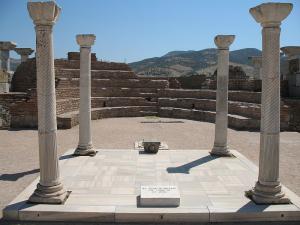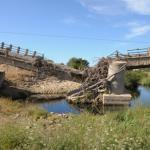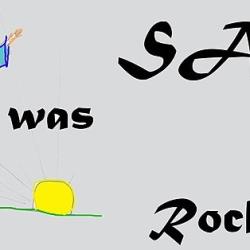New Era of Conscience and Change series
It was a time of change and a horrible time for Jews, apostles, and Christians. The first Christians were primarily Jews. Jews thought Christians should convert to Judaism, or some thought they should just die.
The Christians didn’t know what to believe about anything so arguments were endless. The Romans grew more and more intolerant and drove them all out. The Apostle John walked through this era of change and brought us the prophetic Book of Revelation about coming change. He was a character and interesting to study.
Apostle John
The Apostle John became “the Elder,” but he was the youngest of Jesus’ Apostles. He walked day in and day out with Jesus, and later John’s disciple Polycarp wrote about him. Many think John was the disciple “who Jesus loved.” (According to the Greek words, loved in a social or moral sense. John 21:7.) While artists paint John as young and a little less masculine, Jesus called John and his brother “Sons of thunder.”

James and John, sons of Zebedee weren’t the most temperate people – I like characters. They were zealous, outspoken, and even thunderous. John wanted to call down fire on a Samaritan town but Jesus said no. My experience with fire is just short of being a fireman. Whenever I think of calling down fire, I remember that fire can burn you, so I don’t experiment with it. If you’re not smiling, I’ll have to spray you with a squirt gun.
I think Jesus knew John was a protector. Jesus frequently selected him to go with him. James, John, and Peter went with Jesus as he prepared himself for being taken and killed. One of those with Jesus pulled a sword and cut off the priest’s ear. Was this James or John? Probably but we don’t know for certain.
As Jesus died on the cross he charged John (probably) with the care of his mother, Mary (John 19:26–27). John was sent by the other apostles to Ephesus as a missionary. Ephesus is near the western shores of modern-day Turkey. Tradition has it that Mary accompanied John to Ephesus.
John’s brother James went to Spain. There were no Jews there, so he was an apostle to non-Jews, at least until around 44 CE. In the year 40 CE, Mary appeared to James to encourage him. According to Spanish tradition, James was beheaded by order of King Herod Agrippa I of Judaea in Jerusalem before 44 CE. Agrippa also tried to kill Peter, but he fled.
Dangerous times
Jerusalem was a dangerous place and the apostles moved their headquarters to Antioch. The Kings in Israel under the Roman Emperors usually had Jewish heritage and were charged with keeping order. Followers of Jesus were seen as Jews and a threat. James’ body was taken to Santiago de Compostela in Spain, where there is a shrine to him.
Jesus’ crucifixion and the Apostle James’ beheading are likely the things that prompted the apostles to move out of Jerusalem to Antioch in Syria to make their headquarters there, and then to disperse in groups to other regions. They generally went in threes with disciples accompanying them.
Antioch was a Hellenized trading area in Syria that would likely have had less of a hostile Jewish community and leaders than Jerusalem, although Jews everywhere were hostile to Christian Jews. “Antioch was called “the cradle of Christianity” as a result of its longevity and the pivotal role that it played in the emergence of both Hellenistic Judaism and early Christianity.” Today it lays in ruins.
John was assigned to “Asia Minor,” which is modern Turkey. Jews had been in the Ephesus community since the 5th Century BCE, probably from the invasion and dispersion by Babylon.
Most of the Apostles went to Jewish areas. Even India and portions of Africa had Jewish communities dating to centuries before Jesus.
The apostles had dual missions in that they ministered to both Jews and non-Jews in many areas. They usually took other disciples (students) with them who learned from them and began their own ministries.
Era of contentiousness and persecution
It was a rocky road in Ephesus and the entire region because of the intolerance of the Romans toward Jews and Christians which was stirred up by Jewish Zealots. The zealots were constantly in armed revolt against the Romans who ruled over them and protected them from invasion. To the Romans Christianity was just another Jewish sect.
Also the various religions in the Roman Empire were endlessly arguing about which was right, creating enormous tension. The Jews were exiled from Rome in around 49 CE. In 70 CE the Romans destroyed the Jewish Temple in Jerusalem, just as Jesus said would happen.
Christianity and the Law of Moses
Also contentious was existing Jews in the area who converted to Christianity (Jewish-Christians), who were the initial early followers of Jesus. They thought that non-Jews should convert to Judaism and live as they did, explicitly following the Law of Moses. Jesus didn’t end Jewish Law for Jews, but said the Law and Prophets were until John the Baptist. He stopped short of invalidating their religious traditions.
The Apostles were also a bit vague on this subject with Jewish Christians. Paul tried to help them understand that if they continued to follow the law of Moses, then Jesus died for nothing and they would be judged.
This is not so for non-Jewish Christians. Rabbinic Judaism asserts that Moses presented the laws to the Jewish people, and that the laws do not apply to Gentiles (including Christians), with the exception of the Seven Laws of Noah (part of the Ten Commandments, or natural laws).
James 2:12 “So speak and so act as those who are to be judged by the law of liberty.” (NASB)
But the Apostles were not vague that the Law of Moses (Jewish Law, Torah) didn’t apply to non-Jews. They were free in all ways to follow the Law of Love that was in their hearts – the law of liberty.
Do the Ten Commandments apply to Christians? It’s a moot point. You can’t act out of love and break any of those commandments. They are “natural laws.” Some Christian denominations dismiss the ceremonial and civil law aspects of the Law of Moses, and feel Christians are still subject to the moral law of Moses.
I believe that a thorough review of the apostles’ writings conclusively indicates the Christian New Covenant is based on the law of love, or law of liberty, in people’s hearts, and not on any part of Jewish Mosaic law. The apostles were against sexual promiscuity, but not as a law.
What books did John write?
John wrote two books and two letters to churches. He preferred to speak in person, so wasn’t the prolific writer that the Apostle Paul was. While there is some debate by scholars about which books he wrote, evidence supports that he wrote the Gospel Book of John, the Book of Revelation, and the two letters to churches named 1 John and 2 John.
It isn’t known whether John could write in Greek. His first language was Aramaic. He may have had a working knowledge of the higher Hebrew and of Greek from the synagogue and association with Jesus.
As a fisherman by trade John was less likely to be educated except through the synagogue. But he lived near a major trading area and may have needed Greek for trade and for communicating about other things with traders and those who spoke Greek.
Koine Greek (Common Greek) had been the “official” language of the region for over 300 years. Learned Jews generally knew Koine Greek and wrote in it. Fishermen usually didn’t read or write – but nothing is known for certain. Others with writing skills likely put the words of the apostles into print.
The Romans once exiled John to the Isle of Patmos where he very likely wrote the Book of Revelation in the tradition of both Judaic prophecy and Christianity. It was about how the Romans would be overturned. Because the Romans were very sensitive to political revolt, the book had to be written in veiled language, even though it was a “revealing.” Prophecy generally was a message of hope in that it foretold that Israel’s enemies would be destroyed … but after the pain they suffered.
Having studied prophecy since the 1970s, and written extensively about it, this series will include some notations on the Book of Revelation, which is relevant to change.
The Gospel of John and The Book of Revelation, attributed to John, don’t exactly match in writing style. But Revelation is a very different theological matter from the life of Jesus. It is intentionally veiled and we don’t know who put pen to paper to record it. And Polycarp, a disciple of John, tells us John brought together other Apostles to write the Gospel of John from their recollections, so we don’t know who wrote down the collective accounts into text. Trying to compare these two books to determine the author is an exercise in futility. There is no clear indication.
For example, Mark was known as the disciple with stubby fingers who liked to write things down, and may have authored the Gospel of Mark. Mark often accompanied the Apostles and other disciples on their journeys. Eventually he is thought to have helped start the church in Alexandria, Egypt.
Take Home Points
The Apostle John saw more change in the development of the early gathering of Christians than any of the other apostles.
John accompanied Jesus for his ministry and execution. He alone of the apostles stood at the foot of the cross. He protected and housed Mary, Jesus’ Mother. He wrestled with the other apostles about the faith, wrestled with Jewish Christians and with battles between Jewish Christians and non-Jewish Christians. He saw the destruction of the Jewish Temple and repeated dispersal of the Jews from various areas. He wrote the Gospel of John and the Book of Revelations.
John knew how to survive change.
As we move on with this series about this New Era of Change, Conscience, and Reassessment, we need to drop the exclusivist ideas that have become tradition without any basis in fact. There is not exclusivism in following Jesus. These are distortions of what the Bible says.
The standard of belief and conduct for Christianity is love, and it’s not an option or usurped by some idea about “Law.” Our conduct is a matter of conscience for each of us to wrestle with. If in doubt, apply love.
There is no law more important than that of our own conscience. If we violate our conscience we condemn ourselves, and we find it harder to forgive ourselves than others.
_____________________________
- Additional Resources
How to Keep Millennials Engaged in Church – on Patheos
What Is Meant by Truth? – on Patheos
Tabernacle of Hate – False Religion – on Patheos
10 Reforms Christianity Needs to Make Right Now – on Patheos
________________________
The standard of belief and conduct for Christianity is love. Legal standard.
________________________
If I’ve challenged your thinking, I’ve done my job.
If you find these articles intriguing, please consider joining the mailing list.
___________________
Our answer is God. God’s answer is us. Together we make the world better.
– Dorian














